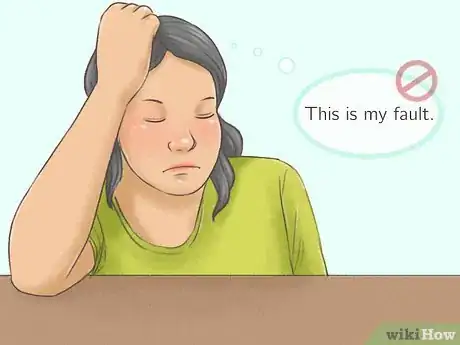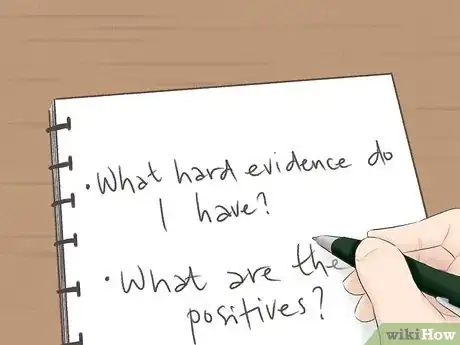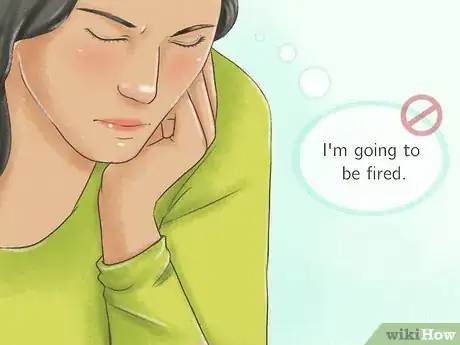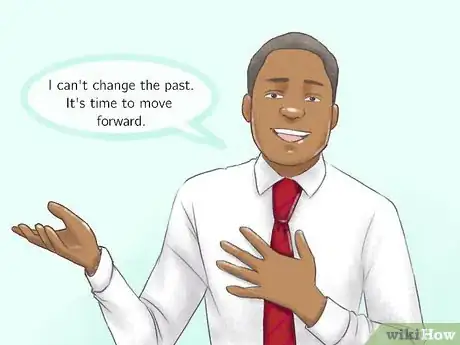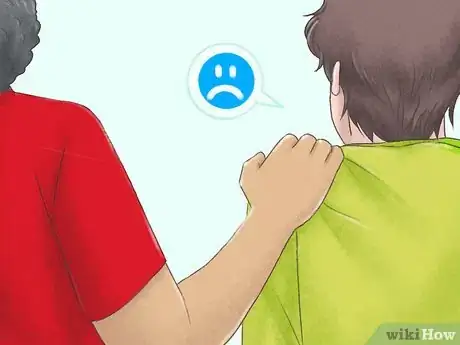This article was co-authored by Sydney Axelrod. Sydney Axelrod is a certified life coach and the owner of Sydney Axelrod LLC, a life coaching business focused on professional and personal development. Through one-on-one coaching, digital courses, and group workshops, Sydney works with clients to discover their purpose, navigate life transitions, and set and accomplish goals. Sydney has over 1,000 hours of relevant coaching certifications and holds a BBA in Marketing and Finance from Emory University.
There are 14 references cited in this article, which can be found at the bottom of the page.
wikiHow marks an article as reader-approved once it receives enough positive feedback. This article has 25 testimonials from our readers, earning it our reader-approved status.
This article has been viewed 350,812 times.
Bad thoughts can haunt you for days, weeks, or months if you don’t deal with them. They often come up when you least expect it, as you over-analyze situations or believe that someone has slyly insulted you. Though painful, bad thoughts are natural, and your brain has ways of dealing with them. While you should always seek help if you suffer from serious depression or recurring bad thoughts, more often than not you can work through them on your own.
Steps
Stopping Bad Thoughts
-
1Remember that occasional bad thoughts are normal. This is possibly the single easiest way to start addressing your problems. Too often you believe that you are the only one with problems, or that no one understands what you are going through, but bad thoughts are a part of life and, most importantly, they will go away. Don’t beat yourself up for having bad thoughts, because they aren’t your fault.[1]
- Avoid language like “This is my fault,” “I shouldn’t be thinking this,” or “I hate this thought.”
- You’ve had bad thoughts before, and you’ll have them again. But you are still here, alive, and healthy. Your bad thoughts won’t kill you if you don’t turn them into monsters.
-
2Think about what makes the thought “bad.” Why are you upset about this thought? What is making it stick in your head? Oftentimes bad thoughts persist because you feel guilty, angry, or unsure about the future, so thinking about why you are caught on the same thought can help give it shape and find ways to address the problem. Common reasons for tough thoughts include:
- Guilt
- Hurt
- Anxiety
- Jealousy
- Temptation
- Trauma
- Failure or fear of failure
Advertisement -
3Slow down your thoughts with a few deep breaths. It is natural to feel anxious or nervous when a bad thought suddenly crops up in your brain, but resist the urge to get upset or fixate on the thought. Take 30 seconds to stop what you are doing and take five deep, long breaths. Give yourself a moment to address the thought instead of jumping right to irrational or extreme conclusions.
- Try counting to 15 if you still feel nervous.
- You could also color, listen to calming music, or read for a short while.
- Alternatively, head outside, remove yourself from the room, or take a short walk to clear your head.[2]
-
4Ask yourself why you’re having negative or bad thoughts. Once you’ve slowed down and thought about the reason you are upset, it’s time to question why the thought is so negative. Some good questions to ask include:
- What hard evidence do I have for my anxiety or fears?
- What are the positives of the situation I am forgetting?
- Is there another way to look at this situation? How would someone else see me?
- Will this matter in 5 years?[3]
-
5Remain in the moment. Even if a situation isn’t ideal or is difficult, you can still be okay. You don’t have to let bad thoughts overwhelm you. You cannot control the future and you cannot control the past. What you can do is deal with the present. Many bad thoughts stem from forgetting this fact and making predictions or guesses about what is to come.[4]
- For example, you may tell yourself that your test tomorrow is going to be super hard, and you will definitely fail, but your bad thought has no basis in reality. When the test does arrive on your desk you’ve already told yourself it will be terrible instead of finding ways to make it easier the night before. Don’t let your guesses about the future ruin the present.
-
6Put your thoughts in perspective. Your initial reaction to a bad thought will be to blow it out of proportion: “I was tempted by another woman, I must not love my wife,” “My boss didn’t like the presentation, I’m going to be fired,” “Everyone else has a nice car, I must be a failure.” These thoughts are not only simplistic, they are often flat-out wrong. Remember that you are not the center of the universe and that most problems in your life will not ultimately mean much to your happiness.
- Remember problems from years past, like getting grounded or dumped – while they might have felt like horrible thoughts at the time, chances are good you have long since moved on without any real damage.[5]
-
7Distract yourself with something specific that you know gives you comfort. Return to something that you know and love to help take your mind off your problems or give you some perspective. Experiencing something tied to good memories can put the bad thought in perspective – things haven’t always been bad, and they won’t always be bad in the future.[6]
- Re-read your favorite book.
- Bake you mom’s chocolate cookie recipe.
- Go to see your team’s next home game.
- Put on an album you enjoy from your youth.
- Look through pictures of a fun event or vacation.
-
8Don’t try and run away from your thoughts or “push” them out. Telling yourself not to think about something is as good as thinking about it. You spend all of your time saying “stop thinking about my breakup” that you don’t realize you are still talking about your breakup! You need to either move your thoughts in another direction or try and tackle the bad thought head on. Trying to consciously push the thought out, however, will only prolong your problems.
- In some situations it’s best to face the problem directly, while putting it aside for a while might be a better strategy for other situations.
-
9Work on “letting go” of problems. Instead of fighting bad thoughts, take a deep breath, acknowledge them, and move on. This is difficult to learn, but mastering this skill is the best way to fight negative thoughts for the rest of your life.[7] For example, you may be worried that you’re going to be fired because you made a mistake at work. Instead of fixating on what you did wrong, learn from your mistake and take steps not to repeat it in the future. Focus on improving, rather than expecting the worst.
- Think things like, “I cannot control everything in the world,” “I can’t change the past,” and “it is time to move forward.”
-
10Literally “throw your problem away.” This may sound odd, but an Ohio State study found that people who write down their bad thoughts and then throw the paper away had a better self-image than people who kept the paper. Writing is a way of expressing your problems, and physically getting rid of them tells your body that it is time to move on.[8]
- The same study found that even dragging a file to your computer’s Trash Bin has the same positive effects.
-
11Talk through your bad thoughts with someone you trust. Getting your bad thoughts off your chest and into the open is a great way to work through what makes a thought so bad. It also, more often than not, helps you realize that the thought is not as bad as it seemed. Once you’ve put words to your anxiety, you can get valuable advice and perspective from someone who has likely had similar anxieties. Many psychiatrists have found that simply telling your thoughts in a comfortable setting may be enough to eliminate them.
- Bad thoughts are basically talking to yourself, and everything you say sounds true. Having another perspective can help you find the flaws in your logic and end the thought.[9]
- You could talk to a trusted friend or family member as well as a therapist or psychiatrist.
Breaking the Cycle of Negative Thinking
-
1Practice positive affirmation to fight persistent, nasty thoughts. Positive affirmation is taking the time to recognize that you are happy, healthy, and have a sense of self-worth. Negative thoughts (self-deprecating, unworthiness, etc.) can be helped with positive affirmations. Practice saying “I am...” and following it with something you love about yourself, such as “I am smart,” “I am good at my job,” or “I am a loving part of my family.”[10]
- Make a list of your positive attributes and put it somewhere you can see it daily, like on your desk or bathroom mirror.
- Fight bad thoughts head on: If you keep saying “I am too dumb,” recognize the many things you do know with positive affirmations like “I know how to fix cars,” “I can cook,” or “I am intelligent.”
- Once you're conscious of your negative beliefs, you have the power to change them. Instead of thinking "I am not good enough," you could think, "I am enough."[11]
-
2Find ways to fill up your free time. Most bad thoughts come during periods of free time when you brain is allowed to wander without distraction or when you’re exhausted. Find things to do that will eliminate too much time alone, like starting an exercise routine, beginning a writing or art project, or community service.
- Being alone is not bad, but being alone with no idea what to do can create anxiety and apprehension.
-
3Recognize people that trigger bad thoughts. Relationships are some of the most fraught, psychologically difficult landscapes to navigate. You may find yourself trying in vain to figure out what the other person is thinking, if your friend meant to insult you, or if someone is talking behind your back. If you have a friend or significant other who constantly triggers bad thoughts, however, this is not your fault. For whatever reason, this relationship may not be healthy.[12]
- Give yourself some space from negative people – do the bad thoughts disappear when you haven’t seen them for a while?
- Avoid friends who constantly insult you or make jokes at your expense, skip meetings with you, or don’t respect your time or hobbies.
-
4Be proactive about solving bad thoughts. Make a list of all the things you could do to address your bad thought. For example, if you are worrying incessantly about your relationship, ask yourself what you can do to make things more comfortable. Plan a date, purchase some flowers for your significant other, talk to your partner, and go out with some of your friends to have fun on your own.
- You might not be able to accomplish everything on your list, but having a group of actions you could take helps you regain control of your thoughts.
-
5Find a creative outlet for your negativity. Writing things down, losing yourself in an instrument, or painting out your feelings are all valuable ways to explore your negative thoughts and begin dealing with them. Remember to refrain from judgement—the point of art is to express your thoughts, not criticize them. Even if you never show your project to anyone, simply making it can be a great way to direct your bad thoughts through another outlet.[13]
-
6Remember to smile. Smiling has been proven to release chemicals inside your body that makes you happier. So show off your pearly whites and let the world know you are happy, and you’ll be surprised to see people smiling back. Between the social and chemical reinforcement, this can actually make the difference between a sunny, happy outlook and being trapped by bad thoughts.[14]
- The inverse is also true, so making frowny or sad faces can lead to more negative thoughts as well.
- If you’re going through something difficult, make time to watch your favorite comedies to boost your mood.
-
7See a professional if you cannot shake your thoughts. If you are depressed, suicidal, or chronically hurting, you should call a mental health professional immediately. They are trained to help you on the road to recovering your positive thoughts, and will be there to support you as you learn.
- If you do not think life is worth living, call/text the suicide and crisis lifeline immediately. In the U.S., the number is 988.
Preventing Bad Thoughts
-
1Take care of your body. There is a direct correlation between mental and physical health, and one will suffer if you neglect the other. Make sure you prioritize your body so that your brain is well equipped to handle stress and difficult or bad thoughts.
- Exercise 3-5 times a week for at least 30 minutes.
- Eat a balanced diet and avoid junk foods.
- Hydrate with 6-8 full glasses of water each day.
- Get 6-8 hours of regular sleep each night.
-
2Begin a meditation practice. Shown time and time again to promote positive thinking and mental health, meditation is the process of clearing your mind and coming to peace with your thoughts. Find 10-15 minutes a day to sit quietly with your thoughts. Focus on your breathing and let your thoughts drift freely. As you progress you’ll find yourself taking more and more time to meditate, and your bad thoughts will start to slowly fade into the background.[15]
-
3Work towards long-term goals. Most people feel bad thoughts creeping in when they imagine their future, creating stress and insecurity. Write down your goals, then break them up into small, manageable tasks you can tackle easily. Celebrate when you hit milestones, and always you’re your end goal in sight when things get tough.
- For example, you might be worried about thoughts that you will never finish the novel you dream of writing. Instead of worrying, set aside 30 minutes a day to write. As you get more comfortable, make it 1 hour, then 2 hours until you have a few chapters to start editing.
- If you find that you can’t stick to the amount of time that you set, don’t get down on yourself. Simply adjust the timetable to make it work for you.
-
4Have a sense of humor when faced with hardship. Laughing away accidents and misfortune is one of the best ways to stay sharp and sane. Humor will “re-set” negative events in a positive manner, ending the stress and worry. Laughter will give you much needed perspective on your thoughts and make it easier to keep bad thoughts at bay.[16]
- Laugh at yourself too – you shouldn't take your life so seriously that you forget to enjoy it.
- Laughter is contagious, so join people who laugh a lot or tell jokes. If you gravitate towards people who like to laugh, you’ll find yourself laughing more as well.
-
5Find a friend or family member that you can be honest with. Just knowing that there is someone who you can be open and honest with can make bad thoughts seem much less daunting. Building trust with someone takes time, and you’ll need to be a little vulnerable sharing your concerns with another person, but having this bond will ultimately help you realize that you are not alone. You can deal with your bad thoughts when they appear, and there will be someone to help you.
- If you feel like you can’t share your thoughts with someone for whatever reason, consider making an appointment with a professional therapist. They are trained to listen well and help you work through your problems.
Expert Q&A
-
QuestionWhat if I never get rid of my bad thoughts?
 Sydney AxelrodSydney Axelrod is a certified life coach and the owner of Sydney Axelrod LLC, a life coaching business focused on professional and personal development. Through one-on-one coaching, digital courses, and group workshops, Sydney works with clients to discover their purpose, navigate life transitions, and set and accomplish goals. Sydney has over 1,000 hours of relevant coaching certifications and holds a BBA in Marketing and Finance from Emory University.
Sydney AxelrodSydney Axelrod is a certified life coach and the owner of Sydney Axelrod LLC, a life coaching business focused on professional and personal development. Through one-on-one coaching, digital courses, and group workshops, Sydney works with clients to discover their purpose, navigate life transitions, and set and accomplish goals. Sydney has over 1,000 hours of relevant coaching certifications and holds a BBA in Marketing and Finance from Emory University.
Certified Life Coach As humans, we're probably always going to have those thoughts, and that's okay. It's not about getting rid of them—it's more about seeing if you can be in a relationship with these thoughts and not resist them so much. Instead of fighting and clashing with these thoughts, think "Thanks for showing up, but I'm going to choose to listen to a different thought."
As humans, we're probably always going to have those thoughts, and that's okay. It's not about getting rid of them—it's more about seeing if you can be in a relationship with these thoughts and not resist them so much. Instead of fighting and clashing with these thoughts, think "Thanks for showing up, but I'm going to choose to listen to a different thought." -
QuestionHow can I overcome self-doubt?
 Sydney AxelrodSydney Axelrod is a certified life coach and the owner of Sydney Axelrod LLC, a life coaching business focused on professional and personal development. Through one-on-one coaching, digital courses, and group workshops, Sydney works with clients to discover their purpose, navigate life transitions, and set and accomplish goals. Sydney has over 1,000 hours of relevant coaching certifications and holds a BBA in Marketing and Finance from Emory University.
Sydney AxelrodSydney Axelrod is a certified life coach and the owner of Sydney Axelrod LLC, a life coaching business focused on professional and personal development. Through one-on-one coaching, digital courses, and group workshops, Sydney works with clients to discover their purpose, navigate life transitions, and set and accomplish goals. Sydney has over 1,000 hours of relevant coaching certifications and holds a BBA in Marketing and Finance from Emory University.
Certified Life Coach With self-doubt, try to identify the negative beliefs underneath your thoughts. It might be something like, "I'm not good enough" or "I don't have it in me to be successful." Then, from that place of awareness, you have a choice; do I listen to this or not? You have the power to change and say, "Actually, having this belief isn't helpful to me. A more helpful belief is that I am enough." Then, practice living into this healthier, changed belief. It's okay if you have to fake it 'til you make it!
With self-doubt, try to identify the negative beliefs underneath your thoughts. It might be something like, "I'm not good enough" or "I don't have it in me to be successful." Then, from that place of awareness, you have a choice; do I listen to this or not? You have the power to change and say, "Actually, having this belief isn't helpful to me. A more helpful belief is that I am enough." Then, practice living into this healthier, changed belief. It's okay if you have to fake it 'til you make it!
Warnings
- If your bad thoughts do not seem to go away or are holding you back from being able to live without disruption for a couple of months, immediately consult with your doctor.⧼thumbs_response⧽
References
- ↑ http://tinybuddha.com/blog/3-reasons-to-stop-worrying-about-your-negative-thoughts/
- ↑ http://time.com/3699099/slow-down-thought-process/
- ↑ http://au.reachout.com/challenging-negative-thinking
- ↑ http://tinybuddha.com/blog/10-tips-to-overcome-negative-thoughts-positive-thinking-made-easy/
- ↑ https://www.bodyandsoul.com.au/mind-body/wellbeing/learn-to-control-negative-thoughts/news-story/ec522707e24e29e2498ff1708073c0b8
- ↑ http://www.spring.org.uk/2012/10/setting-free-the-bears.php
- ↑ http://psychcentral.com/lib/depression-and-letting-go-of-negative-thoughts/
- ↑ http://www.happify.com/hd/stop-dwelling-on-negative-thoughts/
- ↑ http://au.reachout.com/challenging-negative-thinking
- ↑ http://psychcentral.com/lib/replacing-your-negative-thoughts/
- ↑ Sydney Axelrod. Certified Life Coach. Expert Interview. 30 June 2020.
- ↑ http://www.happify.com/hd/stop-dwelling-on-negative-thoughts/
- ↑ http://www.pickthebrain.com/blog/7-ways-clear-mind-negative-thoughts/
- ↑ http://www.scientificamerican.com/article/smile-it-could-make-you-happier/
- ↑ http://www.spring.org.uk/2012/10/setting-free-the-bears.php
- ↑ http://www.helpguide.org/articles/emotional-health/laughter-is-the-best-medicine.htm
About This Article
If you want to get rid of bad thoughts, try pausing whatever you’re doing and taking some deep breaths to help yourself calm down. You might even go for a walk or listen to some calming music to clear your head. Once you’ve had a chance to relax, try focusing on the present that you can control rather than the future, which you can’t control. For example, if you’re thinking about how you’re going to fail your test tomorrow, realize that your future worries are only ruining the present. If you still have bad thoughts, talk them through with someone you trust so you don’t have to keep them bottled up inside. Keep in mind that recurring bad thoughts are sometimes caused by a mood disorder, so make sure to talk to your doctor if they don’t go away. To learn how to begin a meditation practice to combat bad thoughts, read on.
